So, what’s your personality type? I never wondered, I never asked myself, and I just stumbled on a MBTI test while researching personality disorders. And so I thought ‘yeah, let’s try one of those silly tests, see if you can get a result for free, and take it with a pinch of salt’. In the end, my mind was blows.
In fact, I always thought people (including myself) could only consider me as not having much personality, as I’m easy-going, rarely express a very strong opinion about this or that, and can sometimes easily be swayed by the mood of the moment or a half-thought half-convincing argument.
So, that site I found was https://www.16personalities.com/ . I took the test and the result came: you are INFP-T, the mediator. I will not go into too much details of what this entails, it’s freely available online, although different sites might have slightly different nicknames/detailed interpretations for this. I could actually go on and on, about how this matches me near-precisely. As ever, I’m not really planning for a very structured discussion, just present my own results and a few generic reflections not based on examining each type (if you want a lot of speculations/personal interpretations on these, quora.com is your friend, as ever (as in the case of NPD for instance), some of it is to be taken with a huge dollop of critical thinking, because generalisations based on a single case are so so easy to make).
To start with, I had no idea that these personalities tests were a tool for HR teams (bloody HR) to try and profile people, and occasionally as a ‘game’ for their employess to find their qualities and others’. In fact, the only other person so far who I have personally met who ‘knew’ their type had done the test through her company. Of course, as a tool for personal discovery I find this great, but as you could check some of my feelings towards HR departments in the Work blog, as a tool to rate/compare/assess people, not so much my thing. For trying to understand them though, yes, I’d like to think it’s useful. But again, the only ‘example’ I have, I only had a good chat with, and interactions that went very haywire online, which was really annoying. Amusingly or not, one of the areas where a lot of sites disagree is about best compatible types. Also, while the moment of magic was fleeting (but I don’t even remember at all how this came into the conversation, maybe because I alluded to introversion/extraversion based on my feeling of her on a previous meeting – more on that anon- and I think both of us had a very ambiguous weird relation to that, either in who we were or in our perception) when we both wondered about knowing that website and how amazing (in some ways) the discovery was, the rather weird Anglo-French bilinguism in both of us, and her saying ‘jay’ (so it can only be J as there is no G) made me revisit the ‘I’ I thought I heard at the start and was probably therefore ‘E’. To this day I’m still a little uncertain about what type she said she was. The little I know, and the descriptions I have seen make me think that yes ‘ENFJ’ was it rather than ‘INFJ’. But possibly not as stereotypical ENFJ as I am INFP. With added…trouble that she said she wasn’t entirely sure she remembered right (she probably did….), but what she remembered specifically was the ‘-T( (can’t remember which word she used, and apart from the initials, the conversation was in French). In a weird way, while I’m still not sure how to interpret it (maybe as a ‘don’t trust me, I’m somewhat unreliable and inconsistent’?), I felt it was odd that she was keen on insisting on that. Why? Because ‘T’ is troubled, and in other analyses it is a reflection of neuroticism. And no, I’m not criticising that (as a T myself), but found it odd to state it as something determining you (positively). As maybe weirder and unpredictable yeah but, not something to wear as a badge or honour. Trouble dealing with stress (kind of proved later, sadly), emotional unstability and poor self-regulation? Can’t say I noticed, but I never had the chance to find out enough. A strong reaction to perceived threats? Possibly, but see my blog on perception, and one I want to write later about….armadillos. The thing is, and I stated it on that day, as I’d been reading about types a little more again in the weeks before (not sure why, weirdly, I thought it would be nice to talk about these, but in the actual conversation, it came about so so naturally without me gearing towards it, it truly was a magical moment of serendipity), is that in my case and maybe a lot of INFP-T, we tend to aspire to being more A (A stands for ‘Assertive’ in the types), and I felt I was getting there a little. To be fair, while 2023 (I think I will write a lot more about this year in the music review of the year….), has been ups and downs, but on occasions, sure I have been more assertive than ever before. So yes, I can’t speak too much of someone I barely knew, thought interesting and sometimes challenging (as in will help me challenge my own perceptions, not someone ‘difficult/demanding’). But personality types don’t exclude mental pathologies or other stuff, and to this day I can’t figure if she is ‘just’ insecure or more narcissist or such. I don’t think so, as my objective and some subjective criteria after the previous long experience told me a lot of the characteristics weren’t there, I was only a little troubled by one look in a photo I saw, which reminded me of ‘my’ NPD person, but I am very aware that one look in one photo does not say much beyond a state of mind at a moment in time. At best. Anyway, the couple of negative signs were the seemingly manipulative/bossy personality, and giving opinions when not really asked.
But being me, I tried to find a lot of excuses for her (and tell her, which probably was not the right thing to do), and also took opinions on board even unsolicited, when I felt they made sense, and this time without remarking that I didn’t actually ask for an opinion at this stage (the case I have I mind was strange-ish, I could ‘understand’ the interpretation, but as I try to be precise with words, I’d merely mentioned that I might ask for her opinion in the future). The thing is, a little look at the personality type and it seems like INFPs in particular can feel ENFJ as being manipulative. Yet, that was online. In the ‘reality’, I felt she sure was maybe too keen on ‘leading’ but she was doing so gently and without any coercion, and as I said, while our terms/aims may have been somewhat at cross-purposes, I felt there was a great connection there and a lot of tastes and opinions of the world in common, and a few experiences too. Still can’t figure out if she was a really good person as I believed (but I’ve been burnt before wanting people to be good when they weren’t so should know better, in this case, can’t see there’s a lot of evidence either way at my disposal if I’m trying to be objective, but I had an intuition on the second time I met her, and felt she really was someone I’d like to learn to know better, I felt a protective distance coming from her, rather than a manipulation….and I still believe I was completely right on that particular aspect of things).
Yeah, I have digressed a long long way, because I’m still kind of fascinated, and frustrated by answers I never got and may never get, and a lot of it rooted in miscommunication and one-way efforts to understand the other. But insecurities/Ts got in the way, and when you are not constantly there to allay someone’s fears and they run away with their own interpretations instead of seeking deeper (is that a characteristic of ‘J’s? I don’t know, but seeking the depth is definitely an INFP thing, though…ENFJ’s they’re meant to be authentic too? I’m confused now), it’s hard to understand each other. And so I have not got a chance to speak and express myself again (well I am with all this website, but it’s not addressed to anyone in particular), and while I felt I’d managed pretty well for once to not run away with just the possibilities of feelings, rationality and strength didn’t help. Looks like I’ve learnt to assert myself and wilt a little less under pressure, and it’s true, while I get knocked down a lot, I always try to get up again and stand for what I believe in, long term. I never truly run away, because I feel it’s best I faced my fears. A lot of my reactions to (mostly mental) adversity in the last twenty years have been based on that.
Me writing all this above is also in some way a reflection on my ‘type’ I guess. INFPs tend to see the possibilities, all of them, but are not necessarily very good at assessing probabilities and acting on these. Dreams are too good to renounce, nightmares too possible to exclude. Also yeah, idealistic types, mostly passionate, and that thing everyone revendicates : ‘authentic’. I guess it’s true. I’m not good at flattering people, especially if I don’t mean it. ‘My’ NPD person was extremely good at that (and was upset I wasn’t) and justified it by ‘making other people feel good about themselves’. It’s a noble aim (and I’m excluding the ulterior motives of the NPD people there), and so I could see the value/point of that, but ultimately to me, it’s not something I ever felt comfortable with. I’d rather shut up, even if the truth might show on my face, because while I don’t want to lie by flattering, I’m also not keen on talking people down or criticising them (not the same as constructive analysis of what can be improved….actually another thing of INFPs, which may not be for everyone, I now have to accept that, is that we constantly seek to become better persons and improve ourselves rather than fully accept our limitations). But again, it’s not at the expense or others, and I can see it every day in life and at work, few things give me more satisfaction than helping others. And we find ourselves very late in life. Sure, everyone has their own circumstances/developments and personal problems and a lot of family-rooted things and education, but it seems it is not so rare for INFPs to understand themselves only late in life. I just wish I’d seen at 30 what I have now seen at 50, I’d have a better chance of a happy long-term life I guess.
Anyway, you can find INFPs and other types described extensively here and there, and as hinted in the title, whether you think there are 16 main personality types (or 32 taking into account A vs T) or if it’s a lot of nonsense, my own view is that while this is a very helpful tool to understand if not categorise people (nobody wants to be put in a box), there are as many personalities as people, and so hints are good, but don’t get stopped by thinking someone doesn’t in all aspects fit their definition. To illustrate this even in this test, every category in the results is given as a percentage rather than a black&white ‘you are this’ or ‘you are that’, and so you can be more or less I/E N/S F/T P/J. And A/T of course.
I will put my own results here, well the ones dated from the end of January of this year (2023). Interestingly, I think I have felt at my best probably a week or two before that. I did out of curiosity take the test another time near the end of March, when I was feeling better again after a heavy-ish bout of depression in February. I think some of the figures might reflect on that, and I’d say that when I’m at my best, I am more feeling/intuitive, less turbulent, and weirldy but maybe not su much, also a little less prospective (which means I am more efficient, hence it not being THAT weird).
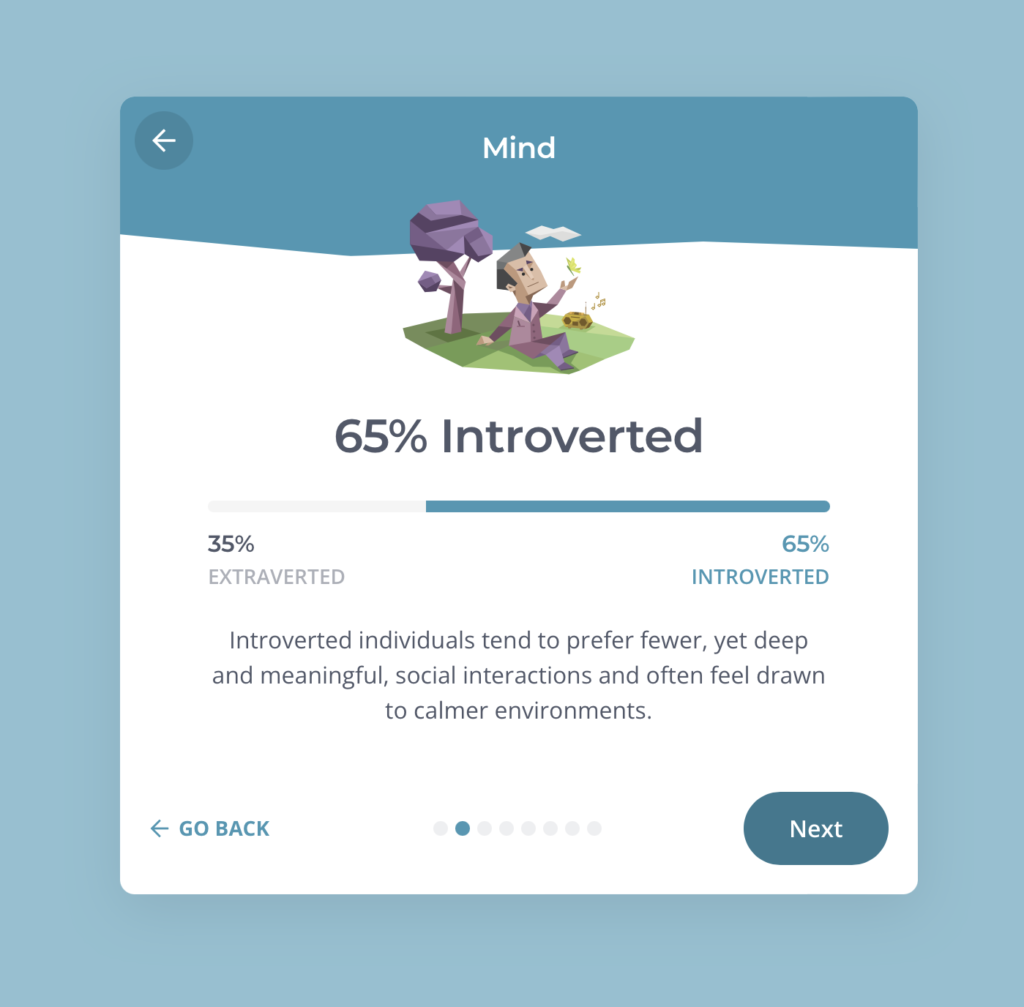
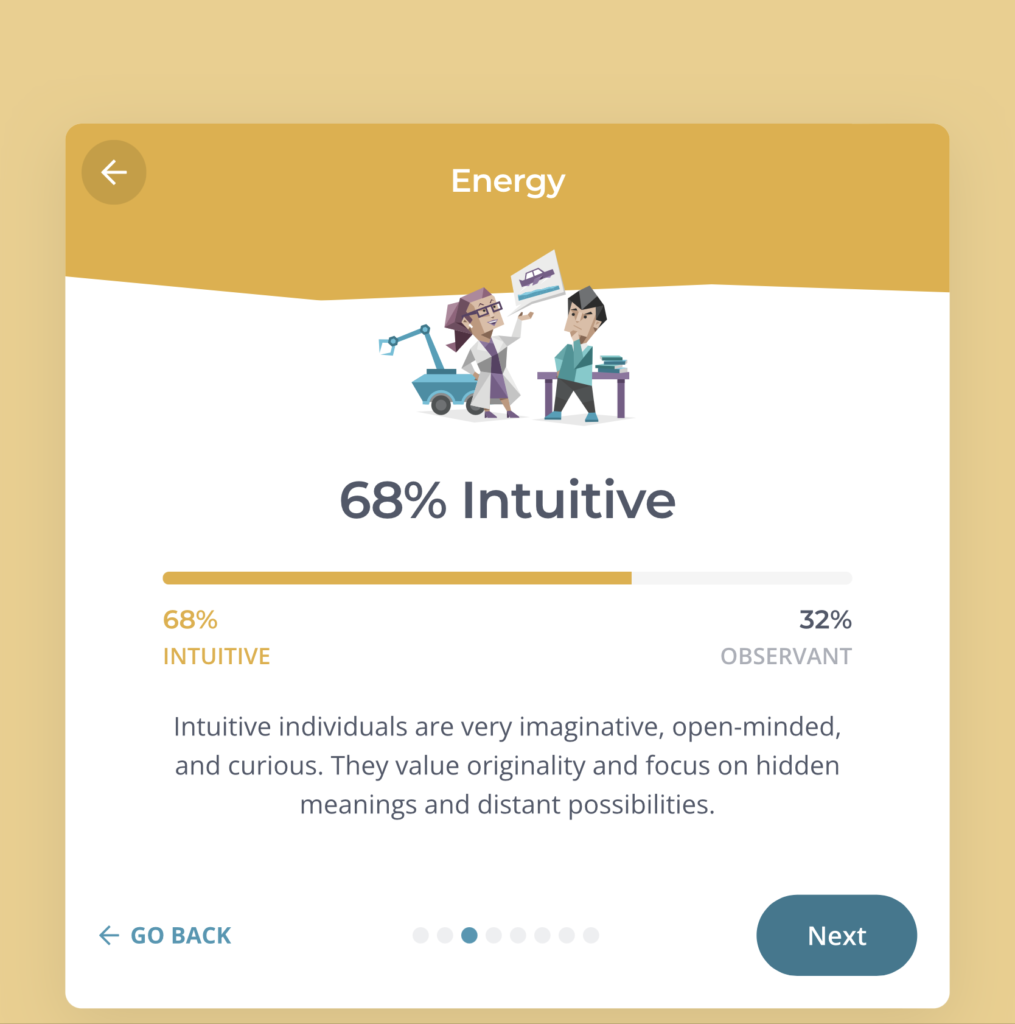
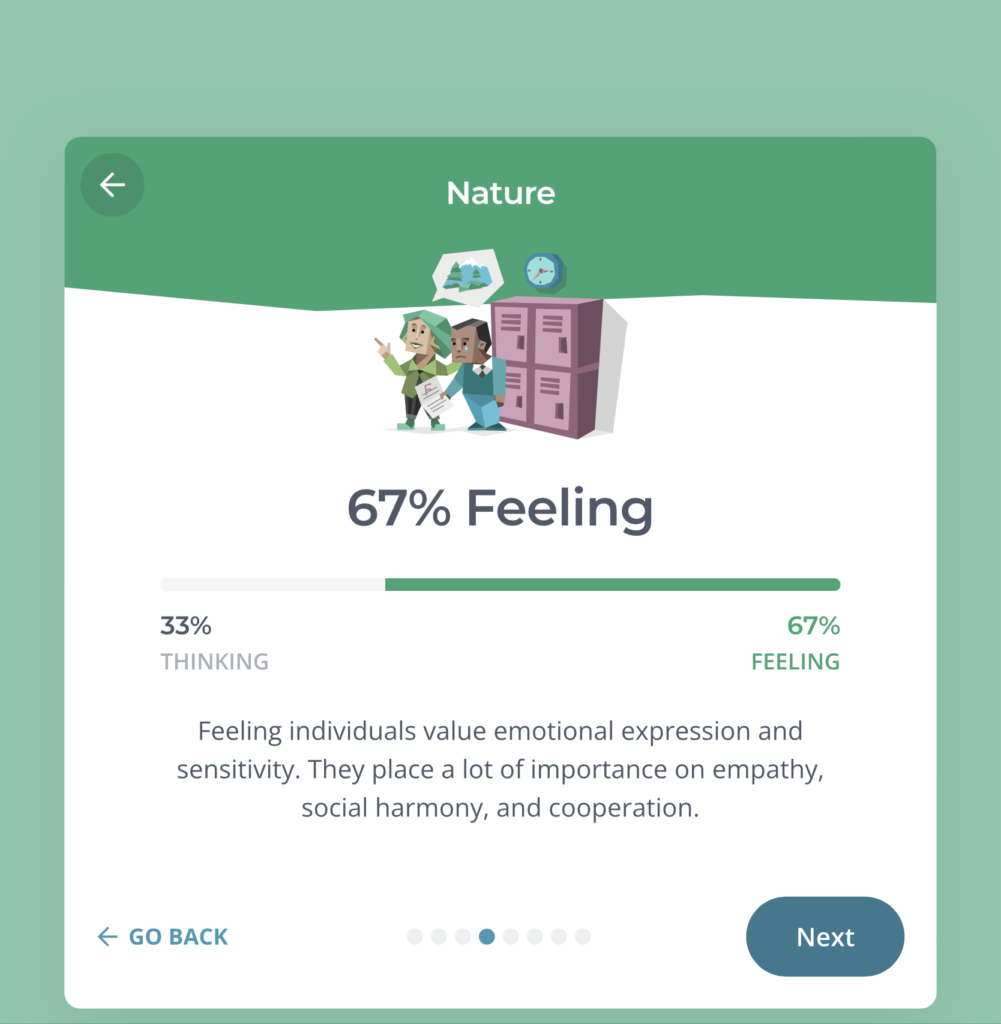
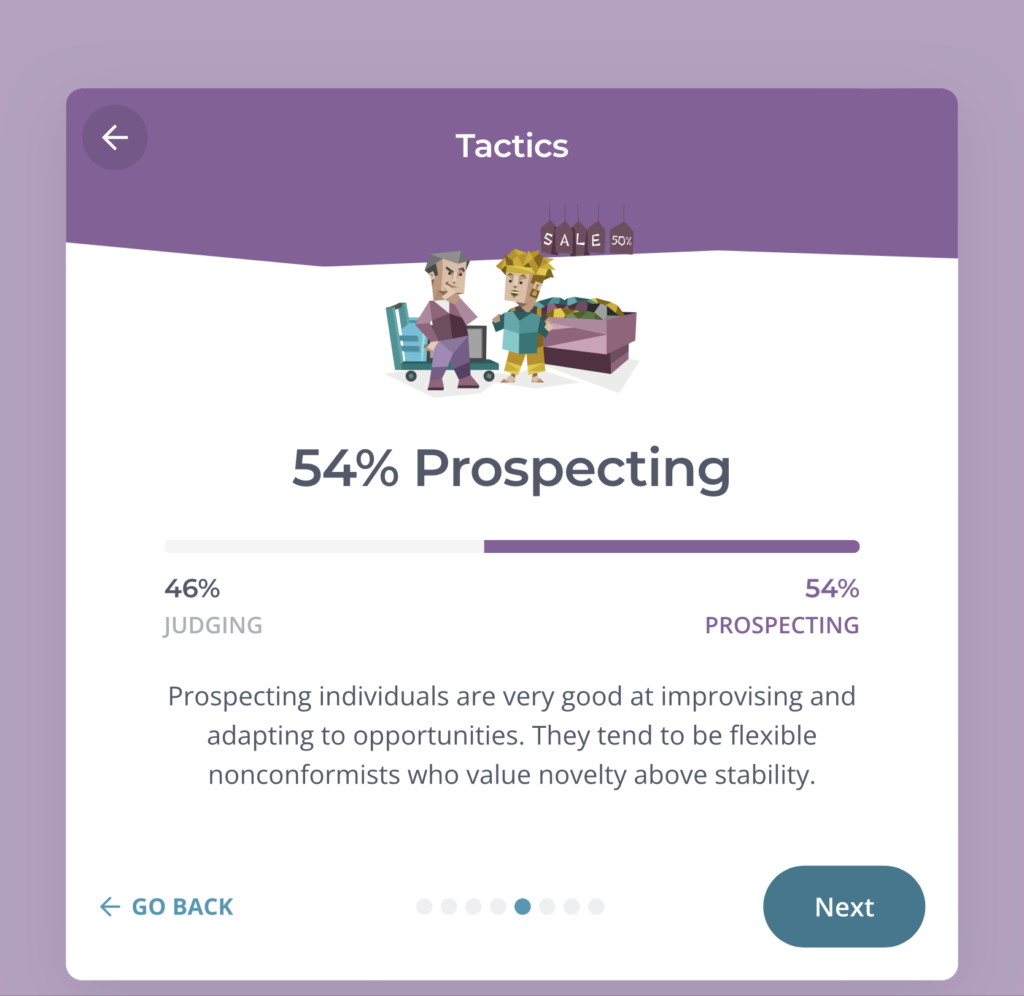
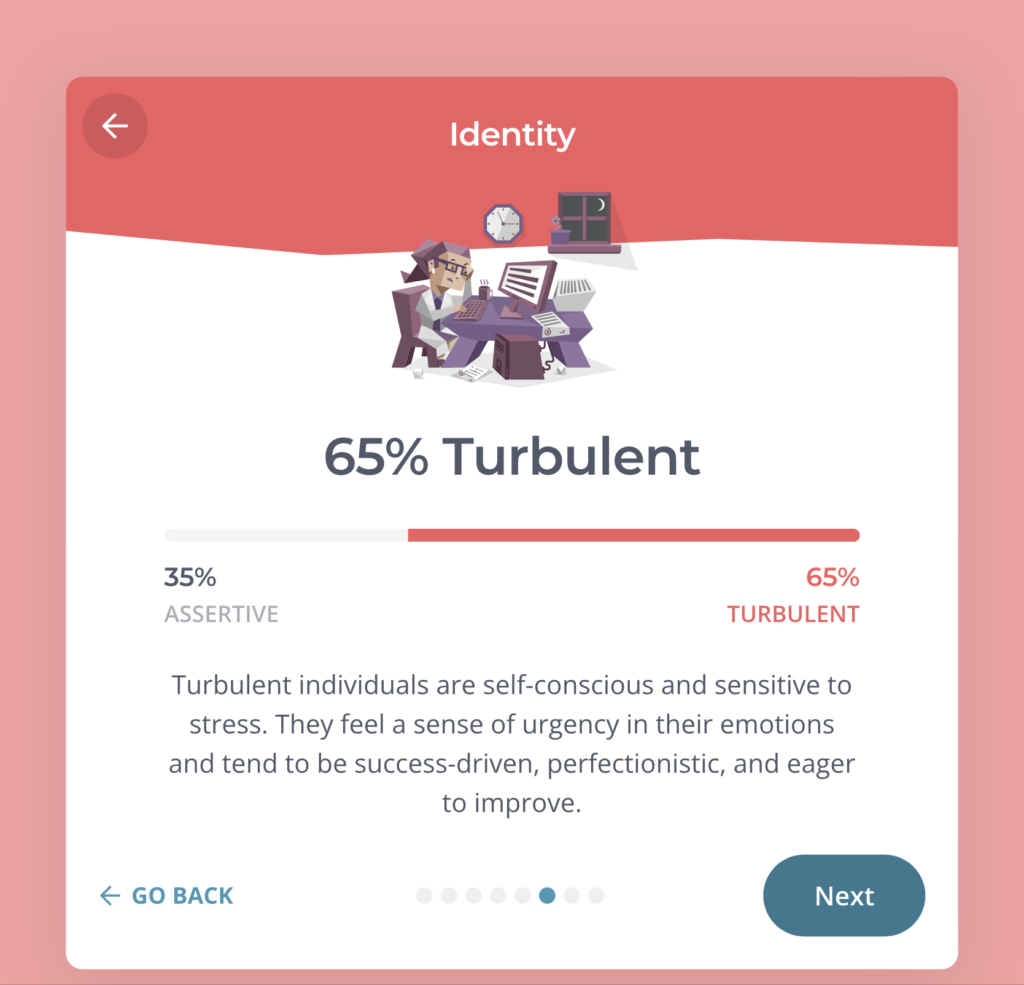
These descriptions actually talk to me fairly well. As a comparison, when I first did the test in September 2021 (so around the total discard from NPD person), the values were 68/58/60/60/74, while in March 2023 they were 69/65/73(!)/56/71. Obviously the numbers are not different enough or taken in enough circumstances to really confirm what I said just above, but you can see that all the main characteristics remain, with some variations depending on evolution and possibly temporary circumstances. The higher feeling end of March might have been because I was getting back to ‘feeling’ more, which kind of culminated back near the end of April….and then I expressed myself as these emotions (related to music in a large part and find myself confident again) went to new depths again. I’d say possibly end of December would have been just as high or more, while end of January, the feelings were struggling a little more. Just my own evaluations, but the reality is the figures above, and I think they are fair.
Now I will be a bit more speculative about my own take on some of these individual components, based on not a lot apart from me liking symmetry and analysis, based or not on observation. I will take the letters in isolation, and in geography (i.e outer or core).
So I or E? I’ve always felt I was a big introvert. All that thinking to myseld and hiding inside of me. In fact there is no doubt that I am an introvert. Yet, on many occasions (and not even necessarily involving drinks) I can act like an extrovert, and in fact, I’m sure a lot of people who know me probably see me as more extrovert than introvert. Of course maybe no-one is 100% of the time introverted, or 100% extroverted. Interestingly (and it was as we were walking along rather than when the topic first came in the café), that other person said ‘I don’t think extroverted/introverted’ is really meaningful, nobody is one or the other. I thought yeah maybe she’s right, but in fact after more reflection I think she’s only partly right. Amusingly that’s how her being ‘E’ (if I retro-heard correctly) didn’t strike me as accurate as in a certain way in our second meeting, not the first, I felt she was more reserved/introverted (both were before that conversation, where I think it was pretty neutral neither very E nor very I, both of us). I do wonder though if this came from her own experience of herself. And here’s the thing, if you look around you will see places describing extroverted introverts and introverted extroverts. Others use the term ‘ambivert’ but I tend to disagree with that as there is a symmetry but not equality. And so I have little doubt that I am an extroverted introvert. And I think she may well have been an intraverted extrovert. The fundamental may be respectively I/E but the other side of the coin is very very present. There’s some interesting insights into extroverted introverts there: https://personalityhunt.com/50-signs-that-proves-you-are-an-extroverted-introvert/ . At the end you will see the hint about introverted extroverts too, and I believe the symmetrical article exists (of course it would be too easy if you just had to swap the terms, so I’ve done the work and located it again for you: https://personalityhunt.com/50-signs-you-are-an-introverted-extrovert/ ).
For the other letters, I’ve not much researched. N(tuitive?) F(eeling?) are words I like. I think I’m clouded sometimes because education and work (engineering) have very very much hindered me in these. Too much thinking and the number of times my intuitions were completely correct but I tried to rationalise to counter them, it’s been killing me many times and stopped me from some greater moments of happiness and satisfaction. But I never feel better than when I am at peace with myself, in tune with my feelings and listen to my intuition. Yet, as in everything this can be wrong (and I suspect losing track of a people or two has been because either they or I have got some erroneous thinking getting in the way of our correct intuition or feeling about each other). But I’ve not really looked into sensing and thinking. In fact, I think many times I have used the word ‘I sense’, but maybe it was more of an intuition or feeling. See, I’m not a specialist, I just like to think the two letters being in the middle are the core of the person. And so even if they can get things spectacularly wrong when their smaller thinking bit gets in the way, I think ‘NF’ people like to connect. And possibly don’t need many words. I always long for that feeling when just the eyes and the soul, the touch maybe, are enough to communicate.
As for P vs J. Again I’m trying to not look too deep into the literature. J is judging (not to be confused with judgmental, I believe), P is prospecting. Which makes it quite bloody obvious that I am P and could never be J. I like to explore, consider all the possibilities, not take things for granted (I still do at times, and every single time reality reminds me that there are more possibilities that I hadn’t envisaged outright), investigate (remember my ideal career would have been investigative journalism, and I started work in validation testing and in any case, even to these days, I try to explore things before asking for help or information to other people – it’s not always great, because people can get the wrong idea when you try to observe behaviours, but there’s a huge difference between a stalker and a curious person, one of my big problems on any topic is that – back to the introversion- I’ve not always expressed that curiosity). But the world needs Js, otherwise we’d probably never get anything done. Through my own tastes and experience (see Anarchy blog and others), I hate to control or be controlled, but a lot of the time, I need to be gently nudged, either pushed or pulled a little, but I will only follow you if I agree with your aims and if your values match mine (don’t worry, I still think I got way-laid a few times and compromised things I shouldn’t have compromised — but then eight years grappling with a NPD-person without realising, that’s not great, but at least it helped reveal to myself the fundamental mistakes and flaws I was exhibiting, and I’m not sure I’ll ever be completely healed; problems were revealed, flaws exploited, but I remain rather lucky compared to some people who are bona fide victims who have actually fully shared the life of NPD people for years).
Right, I think I’ve essentially written most of what I wanted to write on this topic. There’s one more thing, still coming from that same conversation originally, the second walking part. She said something to the effect that these personality test are limited (I tend to agree, again, see continuous spectrum vs 16 personalities), and that personality can change. And that’s kind of an intriguing perspective that I’m not sure I entirely agree with. Again, in keeping with my world of possibilities, I believe most of everything is possible. But what could drive a personality change? Trauma? For sure.
But short of personality disorder (and that’s why I was quite intrigued by her saying this, because did she think of herself, examples she knew, or just from a generic point of view she believed was true?), I’m not certain it can change that much in your adult age. Sure it can evolve a bit (see my results above, sure they are only less than two years apart, there are small alterations, yet interestingly, my type didn’t change at all, I didn’t even appear much more A as I thought I might), and if you’re at near 50% in one category, you can easily go through the other side and therefore qualify as another personality type (my curiosity especially regarding E vs I led me to check ENFP, and in many many ways I recognised myself there too to some extent).
Disorders get in the way. (by the way you generally don’t develop Personality Disorders late in life, they can explode but they’re pretty much set in childhood, after that, it’s about managing). PTSD too, but I believe the main ‘change’ possible has to pertain to A vs T (again why her insistence on her remebering the T more specifically as if it defined her more than the personality type remains troubling). Ideally I’d say you want to move from T to A, become assertive, work to get rid of most of your insecurities and instabilities. Self-work or with a therapist or whatever. A lot of work, and regressing back is always around the corner. From A to T? Definitely can’t be deliberate I’d say, but a traumatic event I could easily see triggering that change.
For the rest I don’t know. I don’t think a NF can become something else (and I’d assume others with different middle letters can’t either), I’ve covered E vs I and how it is indeed only a very partial picture and so I’m again not sure you can change from I to E or E to I, but you can very much be either E or I at a given time in given company and circumstances. As for P vs J, not too sure this can be changed either, but I’ve not really looked enough into what makes a J. But maybe (see below) there’s a good case to be made that depending on topics and circumstances one can feel either judging or prospective. (But sure my ever-thinking mind also says as hinted above that nobody is pure NF, as our thinking also gets in the way, sadly), mind you, the results also show that I’m not too heavily P after all.
Remains the small ‘theory’ hinted at and that I believe is entirely mine: opposite attracts? Maybe but not really. And that’s where my graphical interpretation come. Perhaps with the outer letters (E/I, P/J), those that are not so always clear cut, opposite attracts. Knowing that you are fundamentally one or the other. Whereas with the inner letters (see now why I like to call them the ‘core’, just because of their positions there), it’s best to have similar ones assemble.
But yeah, that’s theoretical bollocks, because….I’m INFP, I believe in possibilities, there are stats, but any one type can get on with any other type on an exceptional basis. It’s just that sometimes you have to believe the probabilities, and so maybe that little theory can find credit.
